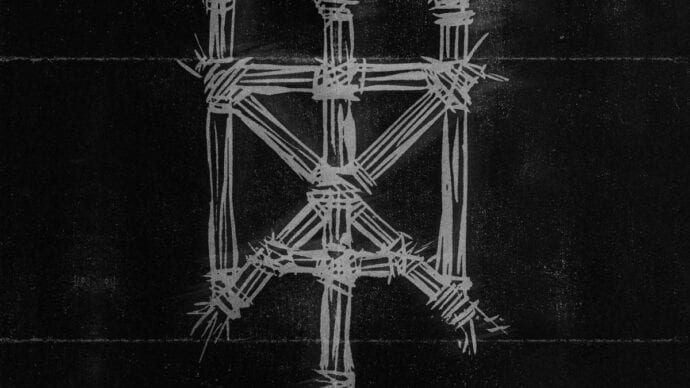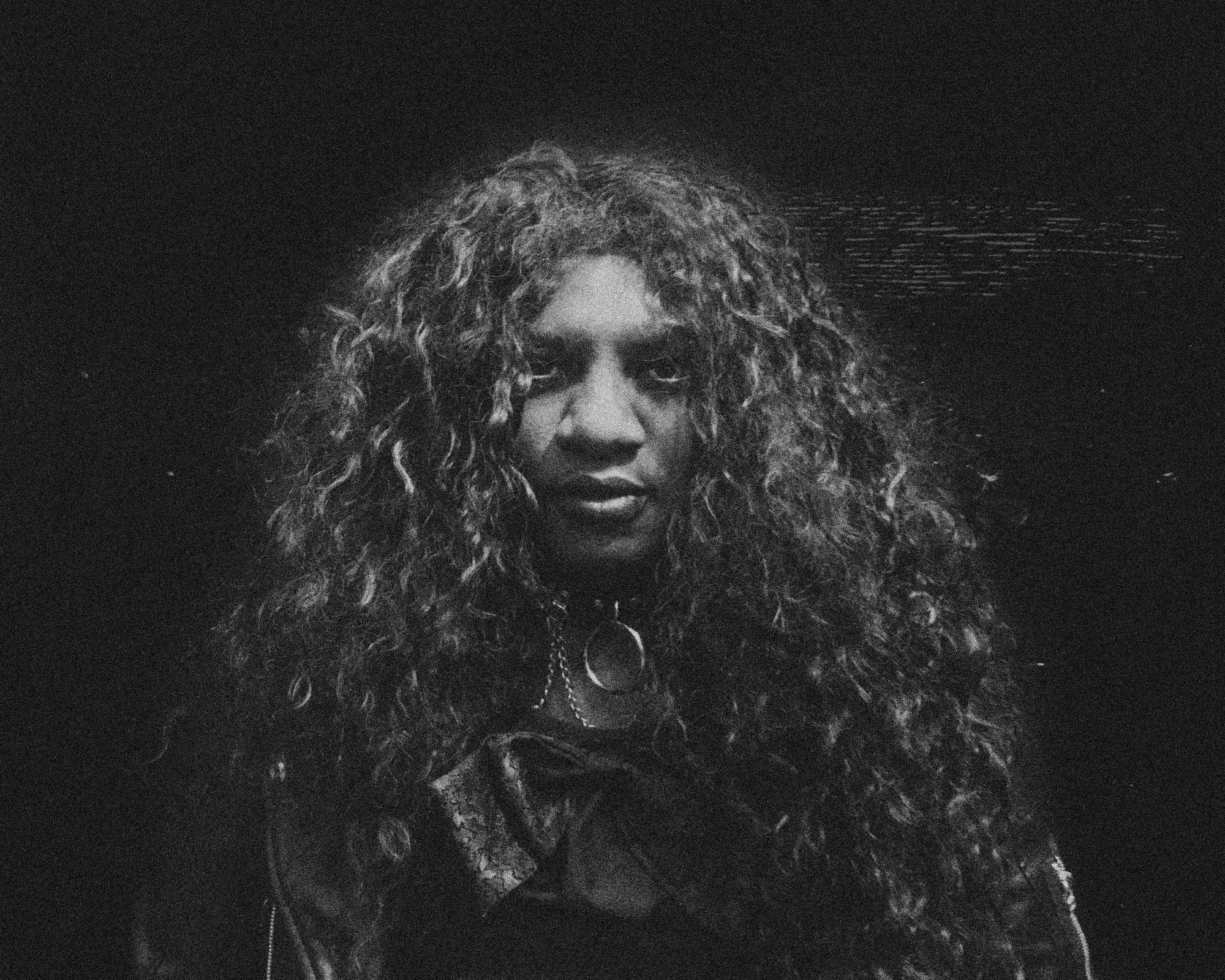Montreal’s Backxwash exorcises a lifetime of demons on their latest album, God Has Nothing To Do With This, Leave Him Out Of It. The Montreal-based transfemme rapper and producer, also known as Ashanti Mutinta, grew up in Zambia and spent their childhood in church. While their supernatural horrorcore sound has already made a splash, Backxwash’s May 30 release is a bold progression into deeply personal territory. Recordings of a gospel choir from their African congregation collide with samples of Black Sabbath, Led Zeppelin and David Lynch’s “In Heaven” (from the film Eraserhead) in an invocation of self-altering fury.
“I definitely feel the fiercest that I’ve ever been,” says Mutinta. “In my previous projects, I never really talked about myself like this. The words were true, but also a bit hollow because I wasn’t putting myself in the positions of what I’m doing now.” As they started to write lyrics about their real-life experiences, Mutinta discovered things they initially didn’t want to know before realizing it was who they really are. “Once you rip off that bandage, it just starts flowing out!”
Mutinta’s musical journey began in Zambia at age 13, when their older brother brought home a copy of the electronic recording program Fruity Loops 3. They struggled with its limited capabilities but were still able to make beats for kids in the neighbourhood for money, though they didn’t bring home much. The members of Mutinta’s church would ask how much gospel they listened to at home while the teenage hip-hop head collected CDs of Missy Elliott, Redman and The Lady of Rage.
At 17, Mutinta moved to Canada to join their brother and sister in the British Columbia home of two foster parents who gave them a lecture about leaving their creative pursuits behind. Following a five-year break from music and a move to Montreal, their Backxwash project began in earnest with the release of their debut EP F.R.E.A.K.S. in 2018. With lyrics proudly proclaiming Mutinta’s newfound sexuality and gender expression (“I wear this dress / And I undress to impress”), it also marked the beginning of their public transition.
“The same time I started coming out in the open is when I started taking music much more seriously,” Mutinta says. “It couldn’t have come at a better time because music provided me with a kind of therapy. That’s why I like albums: If you follow along from my first release to what I’m putting out now, it’s like experiencing stages in my transition.”
“It was such a big step going from a cis dude to someone who’s non-binary to a trans woman,” they continue. “I reached a point where I realized this is who I am. When I discovered this was possible, everything started making sense with my past, like, ‘Whoa, Mulan is my favourite movie for a lot of reasons!’” they say with a laugh, reflecting on the 1998 Disney film about a young Chinese woman disguising herself as a man.
Horror-influenced hip-hop has a spellbinding history of its own. The roots of this sound can be credited to Memphis’s Three 6 Mafia, the Wu-Tang Clan offshoot the Gravediggaz and even DJ Jazzy Jeff and The Fresh Prince’s “A Nightmare On My Street.” While Mutinta initially resisted the subgenre’s title due to its connections to artists they consider “cheesy” (think Eminem and Insane Clown Posse), it was Detroit rapper Danny Brown’s 2016 album Atrocity Exhibition (inspired by both the Joy Division song and J.G. Ballard novel of the same name) that became a formative influence.
“At first I was turned off by [horrorcore] artists trying to be as violent and shocking as possible,” Mutinta says. “I like the arty, experimental side much more.” Mutinta has drawn inspiration from the recent wave of marquee horror films as well. “There are cheesy slasher movies for sure, but you can also do something more complex like Hereditary, Midsommar or Get Out.”
Backxwash’s sophomore release, 2018’s Black Sailor Moon, continued to explore eerie aesthetics while simultaneously shaping their individual approach. With rapid-paced flows and fiery chants, the album’s title track has become a staple of live performances as fans shout along to its hook: “I just pulled up in a skirt!” Last year’s album, Deviancy, revealed even more range with spooky standouts like “Don’t Come to the Woods” and the raging “Devil in a Mosh Pit,” juxtaposed with the tender love song “You Like My Body The Way It Is,” dedicated to Mutinta’s partner during moments of fragility. “It’s so important to have somebody at your side that can reassure you things aren’t so bad,” they say. “I was going through that while I was writing it, so it’s definitely based on real-life experiences.”

Backxwash's newest album, God Has Nothing To Do With This, Leave Him Out Of It.
God Has Nothing To Do With This, Leave Him Out Of It is the culmination of Backxwash’s various artistic threads. Its title track opens the album in a blast furnace of pained cries and Black Sabbath’s instantly recognizable guitar riffs, while Mutinta reckons with the pain caused by religiously conservative family members. “Into The Void” is a Death Grips-style primal scream of pent up anger, while the thunderous drums of Led Zeppelin’s “When the Levee Breaks” propel “Adolescence” into an admission of their need for therapy. Thankfully, Mutinta can also fall back on their chosen family for support. Both members of Toronto noise-pop duo Black Dresses make appearances on “Spells” and “Black Magic,” strengthening the connections among a community of queer and trans musicians challenging the sonic status quo.
The heavy sounds of Black Sabbath and Led Zeppelin also share a lesser-known history with groups from the genre of Zamrock. In the late 1970s, bands such as Musi-O-Tunya, The Peace and Amanaz (Ask Me About Nice Artistes In Zambia) fused psychedelic riffs and strutting funk grooves with traditional African music. Though Zamrock was not a part of Mutinta’s childhood, one influential act from this era has since become a symbolic influence for Backxwash, a band called Witch (We Intend To Cause Havoc).
“When the colonists came to Zambia, they imposed Christianity on people and told them what they believed in before was demonic,” Mutinta explains. “Honouring your ancestors and their spirits has been called witchcraft for no reason at all. For me, identifying as a witch is more akin to African spirituality than anything else.”
In a similar way, the album’s most intimate sound sources can be traced back to vivid memories from Mutinta’s upbringing. “Amen” features samples from a YouTube video of their church in Zambia transformed into heavily throbbing beats. Pat Buchanan’s Trinity Broadcasting Network was another constant presence in the home of Mutinta’s grandmother, where sermons from bishop T.D. Jakes blasted from her television 24 hours a day. His booming voice filters throughout the album-closer “Redemption,” sharing a tone of assurance with Backxwash’s placidly pissed-off declarations. After years of struggle and self-doubt, they’ve finally found a home in their own musical temple:
I wish I started sooner
Fuck the hallelujahs
Fuck these fucking boomers
Fuck these fucking losers
Fuck these motherfucking fuckers in their fucking two trucks
Fuck these fuck abusers and fuck the fucking rumoursFuck ’em and I will dare anyone
To face me up headfirst while I’m layering these drums
The pain that I’ve done compared to the pain it’s undone
It’s weighing a ton
It’s heavy
I don’t wait for no one.


 Why you can trust Xtra
Why you can trust Xtra


